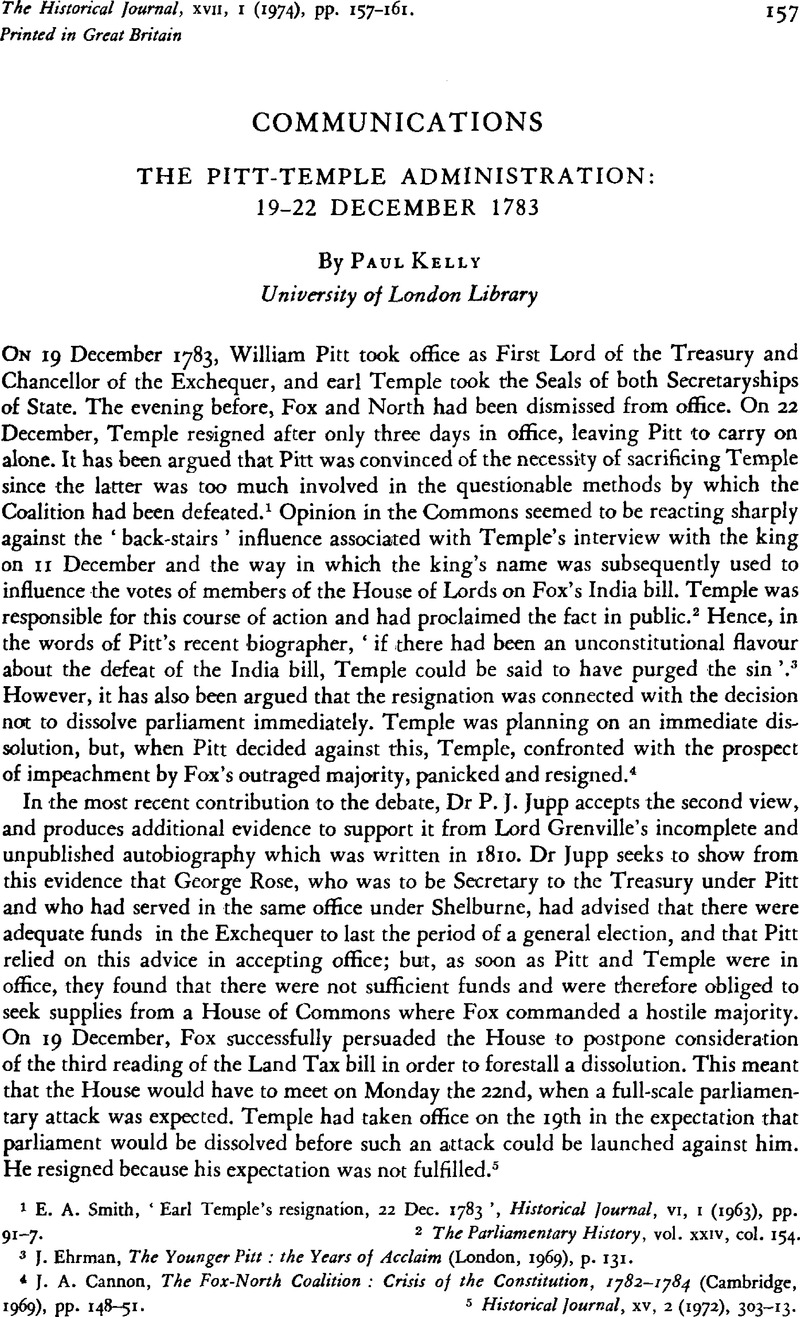Article contents
The Pitt-Temple Administration: 19–22 December 1783
Published online by Cambridge University Press: 11 February 2009
Abstract

- Type
- Communications
- Information
- Copyright
- Copyright © Cambridge University Press 1974
References
1 Smith, E. A., ‘Earl Temple's resignation, 22 Dec. 1783’, Historical Journal, VI, 1 (1963), pp. 91–7.CrossRefGoogle Scholar
2 The Parliamentary History, vol. XXIV, col. 154.Google Scholar
3 Ehrman, J., The Younger Pitt: the Years of Acclaim (London, 1969), p. 131.Google Scholar
4 Cannon, J. A., The Fox-North Coalition: Crisis of the Constitution, 1782–1784 (Cambridge, 1969), pp. 148–51.Google Scholar
5 Historical Journal, XV, 2 (1972), 303–13.Google Scholar
6 Op. cit. p. 125.
7 The appointment is in the Gazette, 27–30 Dec. 1783. The writ for Grenville's re-election was ordered on 26 Dec. (Commons Journals, XXXIX, 856).Google Scholar
8 Laprade, T. W., The Parliamentary Papers of John Robinson, 1774–1784 (London, 1922), pp. 65–105.Google Scholar
9 Cannon, , op. cit. pp. 130–1.Google Scholar
10 Duke of Buckingham and Chandos (ed.), Memoirs of the Court and Cabinets of George III (London, 1853), I, 289.Google Scholar
11 B.M. Add. MSS 38567 (Liverpool Papers), fos. 167–8: Robinson to Charles Jenkinson, 7 Dec. 1783.
12 Cannon, , op. cit. p. 131.Google Scholar
13 P.R.O. 30/29 (Granville MSS), 1/15, fo. 772: Temple to Gower, 9 Dec. 1783.
14 Debrett's Parliamentary Register, XII, 473ff.Google Scholar
15 Gazette, 16–20 Dec. 1783. It was also clear that Thurlow would come into office (Fortescue, Sir J. (ed.), The Correspondence of King George III, vol. VI) (London, 1928),Google Scholar no. 4552: king to Temple, 19 Dec. 1783). According to Mr E. A. Smith (op. cit. n. 29), Lord Howe had accepted office as First Lord of the Admiralty. But I have not been able to find the evidence for this. It could have been, however, that Howe's appointment was delayed because of the difficulty in finding replacements for the rest of the Admiralty Board (see Aspinall, A. (ed.), The Later Correspondence of George III, vol. I (Cambridge, 1962), no. 10: king to Pitt, 28 Dec. 1783).Google Scholar Howe's appointment is listed in the Gazette, 27–30 Dec. 1783.
16 There is an analysis of those who resigned, and of those who replaced them, in Kelly, P., ‘The Establishment of Pitt's Administration, 1783–6’ (Oxford D. Phil, thesis, 1971). pp. 46–65.Google Scholar
17 London Chronicle, 18–20 Dec. 1783.
18 Feiling, Sir K., The Second Tory Party, 1714–1832 (London, 1938), pp. 397–8:Google Scholar Spencer to his mother, 21 and 22 Dec; Pitt to Spencer, 21 Dec. 1783.
19 Aspinall, op. cit. no. 3.
20 Tomline, G. Pretyman, Memoirs of the Life of the Right Honourable William Pitt (London, 1821), I, 174.Google Scholar
21 Smith, , op. cit. n. 33.Google Scholar
22 Ibid. p. 95.
23 Nichols, J., Illustrations of the Literary History of the Eighteenth Century, VI (London, 1831), 79.Google Scholar
24 B.M. Add. MSS 35193 (Bridport Papers), fo. 369. See also Smith, op. cit. p. 95.
25 Connell, B., Portrait of a Whig Peer (London, 1957), p. 146;Google ScholarWheatley, H. B. (ed.), The Historical and Posthumous Memoirs of Sir Nathaniel William Wraxall (London, 1884), III, 199.Google Scholar
26 Russell, Lord J. (ed.), Memorials and Correspondence of Charles James Fox (London, 1853), II, 224;Google Scholar Fox to Lord Northington, 22 Dec. 1783; B.M. Add. MSS 35381 (Hardwicke Papers), fos. 198–9; Philip Yorke to Lord Hardwicke, 23 Dec. 1783.
27 B.M. Add. MSS 42774 (Rose Papers), fo. 39: Lord Percy to George Rose, 1 Jan. 1784; National Library of Scotland, Minto MSS, box 43A: Sir Gilbert Elliot to Sir James Harris, 31 Dec. 1783, reporting a conversation between Lord Chatham and Dudley Long.
28 Wilberforce, A. M. (ed.), Private Papers of William Wilberforce (London, 1897), p. 62.Google Scholar
29 Browning, O. (ed.), The Political Memoranda of Francis, Fifth Duke of Leeds (London, 1884), p. 94.Google Scholar
- 4
- Cited by


